Will Accounting Be Replaced by AI?
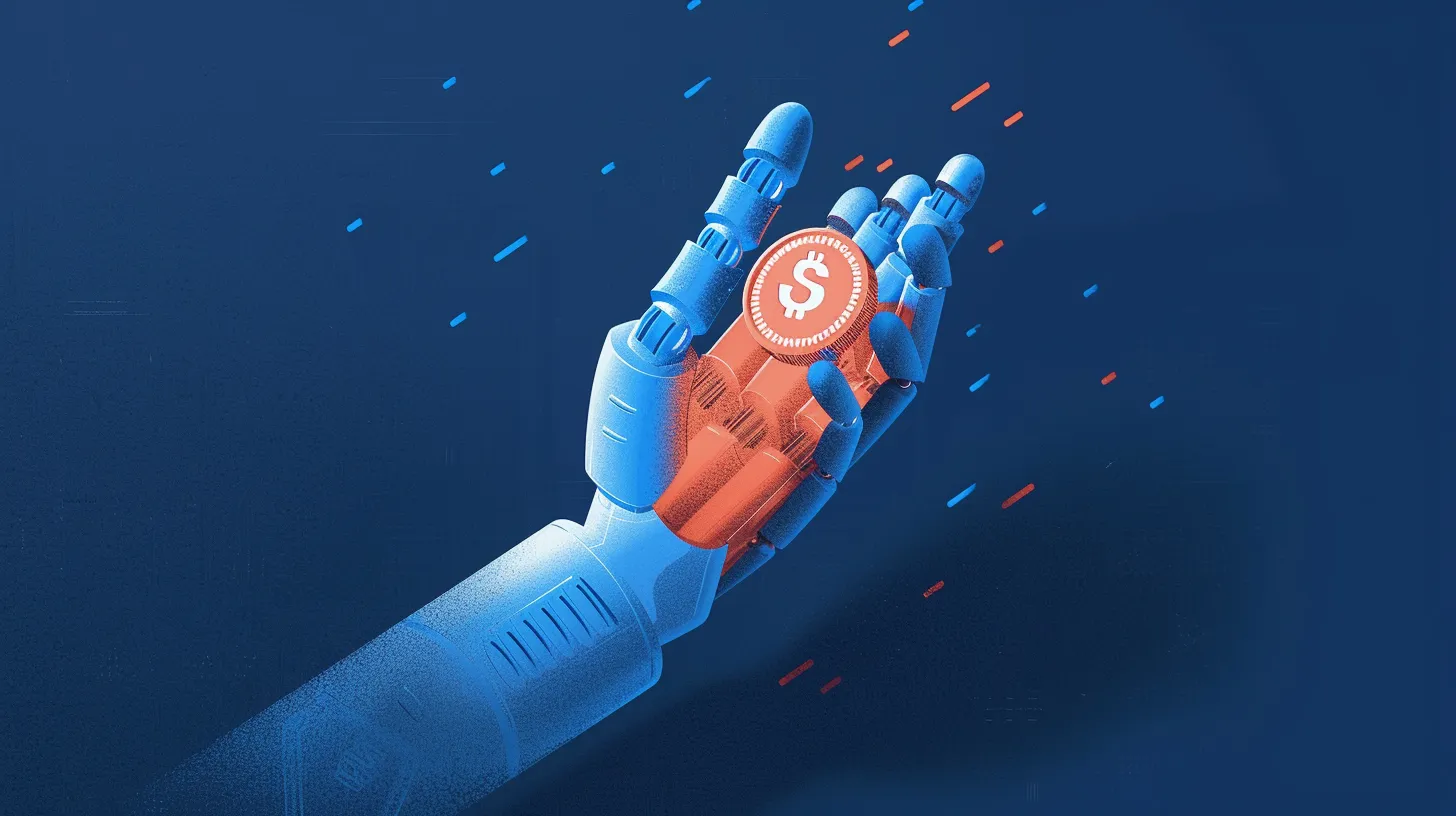
Look, I get it. You're an accountant, and every day you're seeing headlines about AI coming for your job. Your LinkedIn feed is full of takes about automation doing your work while you're left wondering: Will accounting be replaced by AI?
Here's the reality: AI isn't going to replace accountants. But it's absolutely going to transform what being an accountant looks like. And honestly? That's the best thing that can happen to the profession.
Let me break this down for you.
Will AI replace accountants in the future?
Right now, as you're reading this, AI is already integrated into accounting. According to a 2023 Deloitte report, 60% of businesses are already using some form of AI in their financial processes. That's not "coming soon" territory—that's happening now.
But here's where everyone gets it wrong: they think this means accountants are finished. That's like saying calculators would replace mathematicians. Spoiler alert: they didn't.
The critical thing everyone misses is that in finance, you can't afford to be wrong. When you're moving actual money, talking to real customers, and making decisions that could impact a company significantly, you need a human being with accountability to sign off on things. This is where AI-powered finance tools come in as sophisticated assistants, not replacements.
What accounting tasks can AI actually automate?
AI excels at the tasks that traditionally consume significant portions of accountants' time:
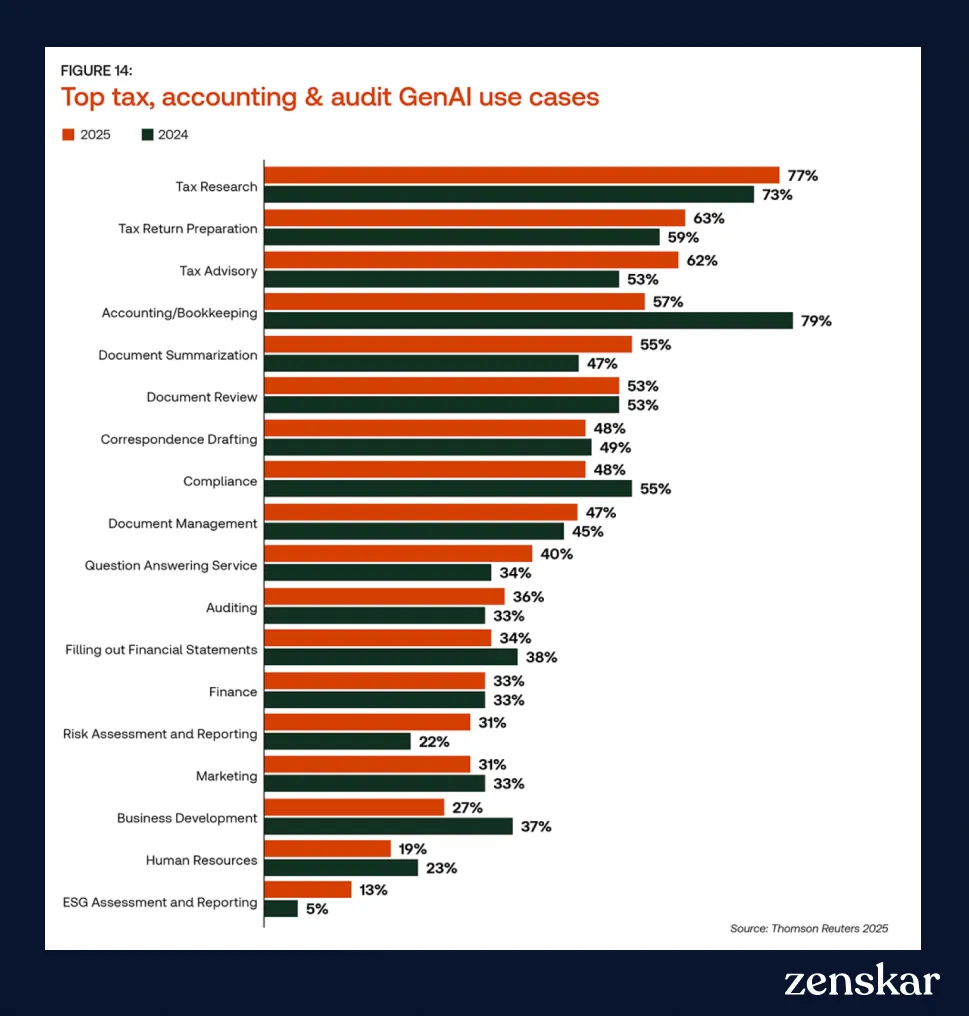
- Data entry: AI can process invoices, receipts, and financial documents with remarkable speed and accuracy.
- Invoice processing: It can extract information, match purchase orders, and route approvals without human intervention.
- Basic bookkeeping: Transaction categorization, bank reconciliations, journal entries—all the foundational work that requires accuracy but not judgment.
- Standard reporting: Those monthly reports that take hours to format? AI can generate those while you focus on analysis.
- Pattern recognition: This is where it gets interesting. AI can spot trends and predict outcomes in ways that would take humans significantly longer to identify manually.
A McKinsey report suggests AI could automate up to 40% of accounting tasks by 2030. That sounds concerning until you realize it's the 40% that doesn't require human judgment or relationship management.
💡Robotic process automation (RPA) is a software designed to handle repetitive tasks that people usually do, especially in accounting. It uses bots to manage things like invoicing, account reconciliation, cash flow reports, budgeting, bookkeeping, document handling, tax prep, and compliance—basically taking care of the routine work so humans can focus on more important stuff.
💡Agentic AI takes this a step further by acting independently to get things done. It can gather and sort transaction data, apply the right tax rules, and guide users through tax filing, while also flagging any unusual issues or decisions that need a human touch. Think of it as a smarter assistant that not only automates tasks but also thinks on its feet to help you work smarter.
Modern platforms like Zenskar's AI-powered contract ingestion demonstrates how this works in practice—AI handles the processing of thousands of PDFs while humans focus on high level decision-making.
Zenskar’s AI extracts key details, including customer details, products and plans, billing cadence, payment terms, and renewals. Get complete control to review, edit, and modify terms. 🙂
How can AI help accountants be more efficient?
Here's what's actually happening: AI is transforming accountants from data processors into prompt engineers.

Instead of spending 80% of your time on spreadsheet work, you get to focus on the activities that actually drive business value.
Consider this: accountants are often overworked and undercompensated partly because so much time gets consumed by routine tasks. AI eliminates that time drain, which means you can focus on work that commands better compensation and provides more job satisfaction.
This is especially significant in public accounting, where busy season create intense workload pressures. AI can handle the routine processing while accountants focus on oversight and client strategy.
A recent PwC report found that 91% of CFOs say AI is already reshaping their teams toward more strategic work. Companies are investing in future-proof finance tech stacks that combine AI efficiency with human strategic thinking.
How are accountants becoming more strategic in their roles?
If you think accountants are just number crunchers, you haven't been paying attention. Today's accountants are financial strategists and the people who keep companies from making costly mistakes.
The accounting world scales in interesting ways. Small companies might have a fractional CFO or outsource everything through automated billing processes. Medium companies start building specialized teams. Large companies? They've got entire departments: revenue teams, accounts receivable specialists, accounts payable teams, payroll specialists—the complete structure.
And they all need proper accounting software solutions to keep operations organized.
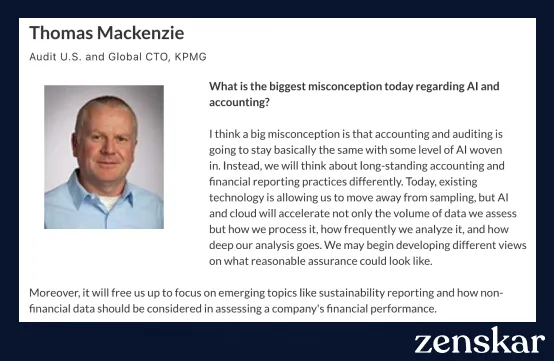
In a webinar on IPO readiness, Ray Ratan, a seasoned CFO, stated:
If your finance team is more than 3% of your total workforce, you're probably not operating efficiently.
It's a useful metric for understanding organizational efficiency in financial operations.
But here's the key insight: according to a 2019 EY study, 43% of accountants already spend more than half their time on strategic and advisory work, not routine tasks. The profession is already evolving.
What aspects of accounting require human expertise?
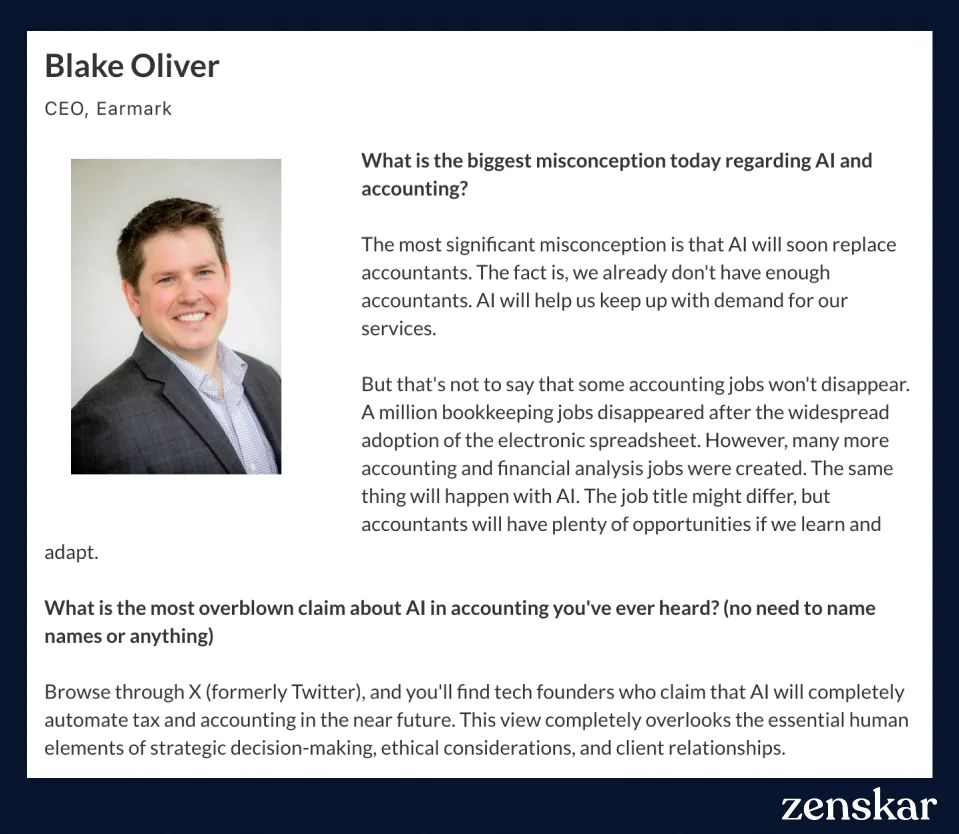
Despite all the AI capabilities, there are aspects that remain uniquely human:
- Client relationships: AI can't build trust, fully understand client concerns, or provide reassurance during challenging times. Relationship building remains entirely human.
- Ethical judgment: When complex situations arise, you need someone who can navigate nuanced ethical decisions, not just follow programmed rules.
- Quality control: Someone still needs to ensure the AI isn't making costly mistakes.
According to PwC research, only about 20% of accounting jobs face full automation risk over the next decade.
Yes, some roles will disappear—mainly those involving repetitive manual tasks. But new roles are emerging too. Someone needs to be the accounting prompt engineer who knows how to manage and optimize these systems effectively.
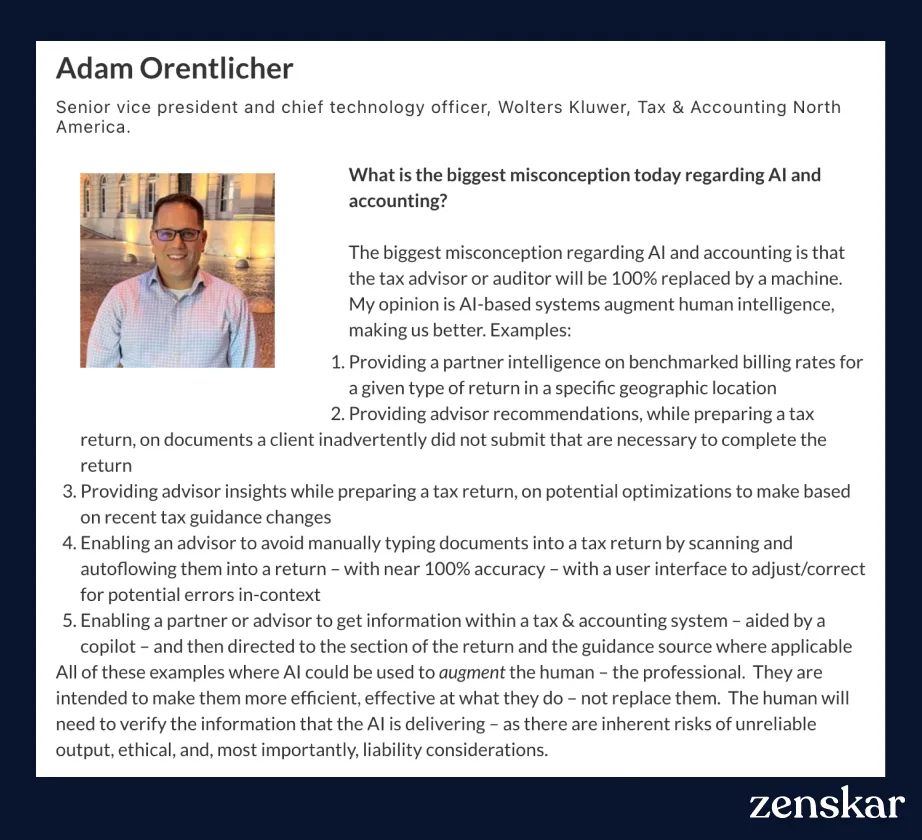
The real risk isn't AI replacing accountants; it's accountants who refuse to adapt being surpassed by those who embrace the technology.
The major accounting firms aren't concerned about AI—they're embracing it. Grant Thornton is using AI for financial forecasting and month-end processes. The Big Four firms are investing heavily in AI capabilities.
But they're all saying the same thing: AI is a tool for enhancement, not replacement.
What skills matter most for accountants in the age of AI?
If you want to thrive in an AI-enhanced environment, here's what to focus on:
- Technology fluency: You don't need to become a programmer, but you need to be comfortable working with AI tools, prompting them, and understanding their capabilities.
- Analytical thinking: As AI handles data processing, the ability to interpret and act on insights becomes your competitive advantage.
- Communication skills: If you can translate complex financial information into actionable business insights, you're extremely valuable.
- Continuous learning: The pace of change is accelerating. The accountants who stay current and keep developing will be the ones who succeed.
- Specialization: Focus on areas that require deep expertise and human judgment—forensic accounting, complex tax planning, industry-specific knowledge.
What ethical considerations come with AI in accounting?
AI in accounting raises important questions that require human oversight:
- Data privacy: Financial data is sensitive. Someone needs to ensure AI systems maintain appropriate security standards.
- Bias prevention: AI can perpetuate biases from its training data. Human oversight is essential for fair financial reporting.
- Professional responsibility: Ultimately, humans remain responsible for the accuracy of financial information, regardless of the tools used to generate it.
Streamline accounting workflows with Zenskar’s AI offerings
The future of accounting isn't about AI versus humans. It's about AI plus humans creating something more effective than either could achieve alone.
AI will handle the routine, repetitive tasks with exceptional speed and accuracy. Humans will focus on judgment, relationship-building, and all the complex work that drives business success.
As a recent EY report put it: "AI in accounting isn't the end—it's the beginning of a new era where accountants drive business strategy and innovation."
Here's what makes Zenskar the future of finance: AI-driven automation. From setting up systems to troubleshooting errors and generating insights, Zenskar's AI-powered agents act as extensions of your finance team, automating tasks across multiple areas without increasing headcount.
Zenskar is designed to evolve alongside the changing landscape of finance, offering unparalleled agility and future-proof solutions.
Ready to see how AI can enhance your finance operations while preserving human expertise? Schedule a demo with Zenskar or take an interactive product tour to see how technology and human intelligence work better together.
We launched our product 4 months faster by switching to Zenskar instead of building an in-house billing and RevRec system.

Frequently asked questions
No. AI is more like an advanced tool that handles routine work so you can focus on the strategic and advisory aspects that require human expertise.
Unlikely. AI can process data efficiently, but it can't navigate complex business relationships, make nuanced judgments, or provide strategic counsel the way humans can.
Primarily routine tasks: data entry, basic bookkeeping, standard reports, invoice processing. Essentially, repetitive work that doesn't require professional judgment.
Technology fluency, analytical thinking, communication skills, and commitment to continuous learning. Focus on developing expertise in areas that require human judgment.
Embrace AI technology, focus on complex problem-solving, build advisory skills, and remember that humans are still essential for the strategic, relationship-heavy aspects of business.















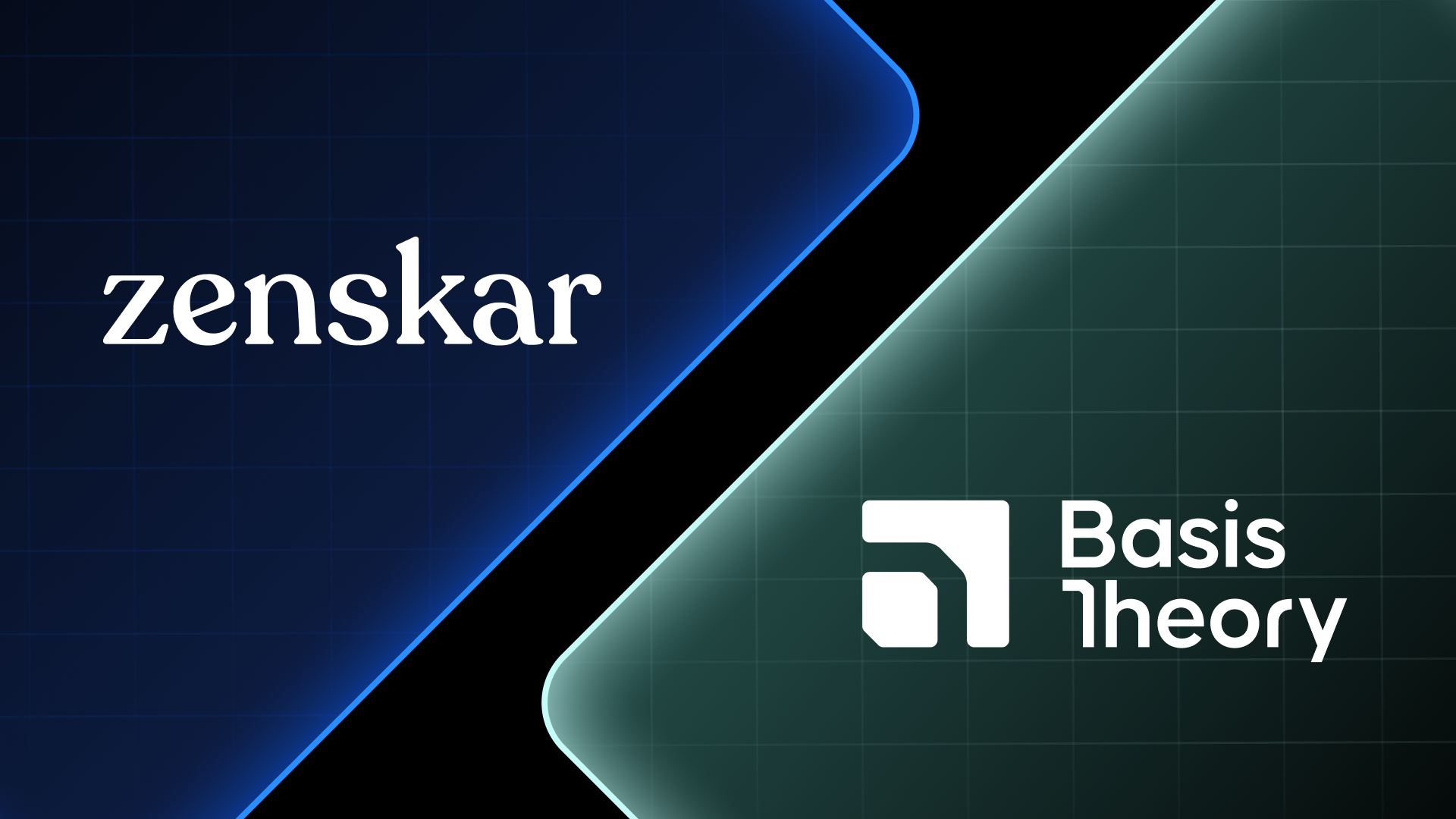


%20be%20truly%20invisible_.webp)



